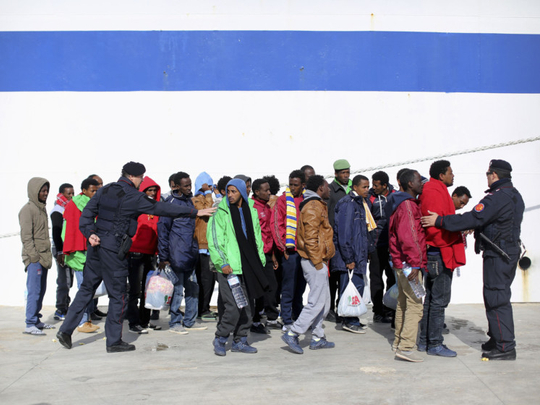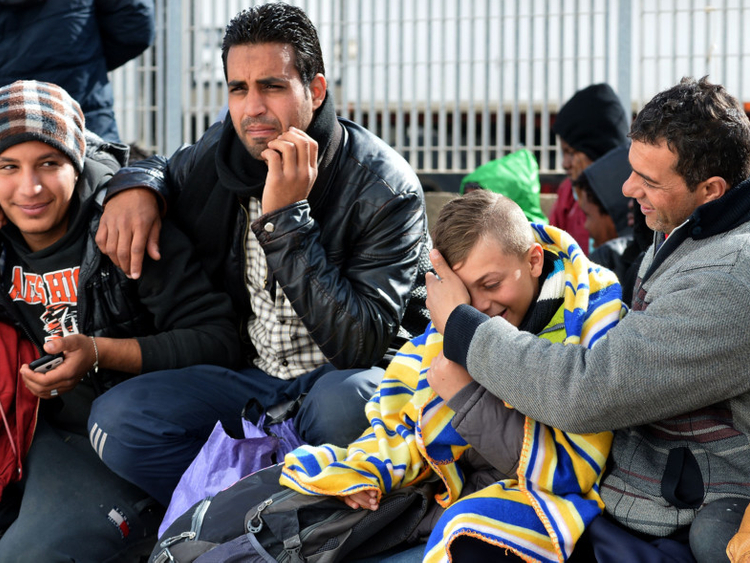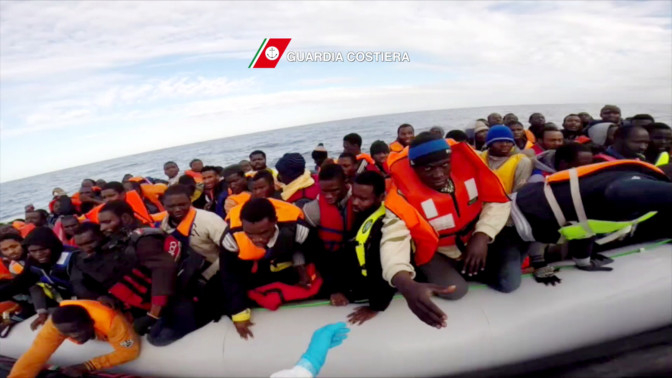
Lampedusa: Sekou Balde is living testimony to the increasing chaos and brutality that is sweeping Libya.
Lifting up his sweatshirt, he reveals the six stab wounds he received when he was attacked by a gang of four Libyan soldiers. They demanded money after raiding the house near Tripoli where he was living rough with other African immigrants.
“They said: Where is your money,” said Balde. “I said that I didn’t have any. Then they attacked me.It was four of them against me. They came to where we were living at one in the morning. My brother was shot dead in front of me — boom, boom — as well as two of my friends.”
The 20-year-old recounted his experiences on a bare patch of rocky land outside the refugee reception centre on Lampedusa, the Italian island that represents the promised land for hundreds of thousands of refugees fleeing persecution and war in Syria, Iraq, the Horn of Africa and the Sahel.
Libya, a country devoid of a functioning government and awash with weapons from the civil war, is now also the major take-off point for people-smuggling vessels across the Mediterranean, with boats full of hundreds of people departing almost daily.
Nearly 8,000 refugees and asylum seekers have reached Italy so far this year, in what would normally be a quiet period for boat crossings because of rough weather in winter. Without exception, the dozens of refugees interviewed by The Sunday Telegraph on Lampedusa painted an alarming picture of Libya descending into ever-greater chaos.
Four years after rebels overthrew Muammar Gaddafi, the oil-producing North African state is being fought over by two rival governments allied to armed factions fighting for control. The more secular of the two is recognised by the West, having won elections in 2013. But it is now in effective exile in the eastern city of Tobruk after being ousted by the Libya Dawn movement, a coalition of moderate and more hardline Islamist factions. Both sides are now in a low-level civil war, while Islamist groups and people smugglers exploit the power vacuum.
All of the migrants spoke of being subjected to random brutality, not only from the Libyan army, police and militias, but also from ordinary citizens intent on robbing them of what little money they had managed to earn from casual work or by borrowing from their families, to fund their quest to reach Europe.
“Everyone in Libya is armed now,” said Djiby Diop, a 20-year-old from Senegal, who spent three months in Libya dodging gunmen. “Every guy of my age has a gun,” he said, speaking in French. “If you don’t work for them, they shoot you. If you don’t give them all your money, they shoot you. Or they shoot you just for fun. Or they will throw you in prison and you have to pay 400 dinars [£200] to get released.”
Diop arrived on Lampedusa after being rescued by the Italian Coast Guard in the middle of the Mediterranean. “It was hard; really hard. There were 90 people packed into a small boat. We had nothing to eat at all. The engine broke down and we were giving up hope. We are so happy to have reached Italy.”
Small groups of Africans and Syrians wandered up and down the island’s dusty lanes, between the reception centre and the main town of Lampedusa less than a mile away, with nowhere to go and no money to spend. They were bundled up against the cold in donated jackets and jumpers — and in the case of one Eritrean, what appeared to be a cream, fur-lined women’s jacket.
The Libyans beat us with sticks and held guns to our heads,” said Bereket Habte, 23, an Eritrean refugee.
“They all have guns. They are absolutely bad people.”
He spent six months in Libya, three of them in prison after being arrested by soldiers as an illegal immigrant.
Abdiwali Suudi Abdule, a 17-year-old Somali, is one of hundreds of unaccompanied teenagers and children who have arrived by boat on Lampedusa since the start of the year. He spoke to The Sunday Telegraph through the fence of the refugee reception centre, as Italian officials loaded refugees into buses, which took them to a ferry bound for Sicily and a larger processing facility.
“We slept out in the scrub, wherever we could find a place,” the teenager from Mogadishu said. “Libya is very dangerous.”
The Telegraph Group Limited, London 2015














